Is AI-Generated Content Hurting Your SEO? The Right Way to Use AI as a Tool
A definitive guide to leveraging AI for content creation without incurring Google’s penalties.
Table of Contents
- Introduction: The AI Gold Rush and The SEO Dilemma
- The Core Problem: When AI-Generated Content Hurts Your SEO
- Google’s True Stance: It’s About Quality, Not Origin
- The Right Way to Use AI as a Tool: A Practical Methodology
- Case Study: From Idea to Rank with AI
- The Future of AI and SEO: What to Expect
- Conclusion: Your Co-Pilot in the Content Creation Cockpit
Introduction: The AI Gold Rush and The SEO Dilemma
Artificial Intelligence is everywhere. It feels like a digital gold rush. Tools like ChatGPT, Jasper, and Copy.ai promise to create blog posts, articles, and marketing copy in seconds. This unprecedented speed and scalability have led businesses and creators to race to produce more, faster, hoping to flood search engines with content and capture traffic.
But this explosion of AI-generated content brings a critical question for anyone who cares about their search rankings: Is AI-Generated Content Hurting Your SEO? The fear is palpable and understandable. You’ve heard the whispers of Google’s “helpful content update,” its intense focus on EEAT, and its ongoing war against spammy, low-quality content.
It’s easy to assume that any content not painstakingly crafted by a human hand is destined for the bottom of the search results, or worse, flagged for a penalty. However, the reality is far more nuanced. The problem isn’t AI itself; it’s how it’s used. When wielded correctly, AI can be an incredibly powerful co-pilot for your content strategy.
When used recklessly, it can indeed lead to penalties and a significant drop in visibility. Many marketers are asking Is AI-Generated Content Hurting Your SEO because they’ve seen both positive and negative outcomes. This comprehensive guide will demystify the relationship between AI-generated content and SEO. We’ll cut through the noise and explore Google’s official stance in detail.
We will provide a clear, actionable framework for using AI as a tool to enhance, not hurt, your search rankings. By the end, you’ll understand that the key to success isn’t avoiding AI, but mastering the right way to integrate it into a human-led, quality-first content creation process. This is the definitive answer to whether AI-generated content is hurting your SEO and how to use AI as a tool for sustainable growth. Understanding Is AI-Generated Content Hurting Your SEO is crucial for digital marketers in today’s landscape.
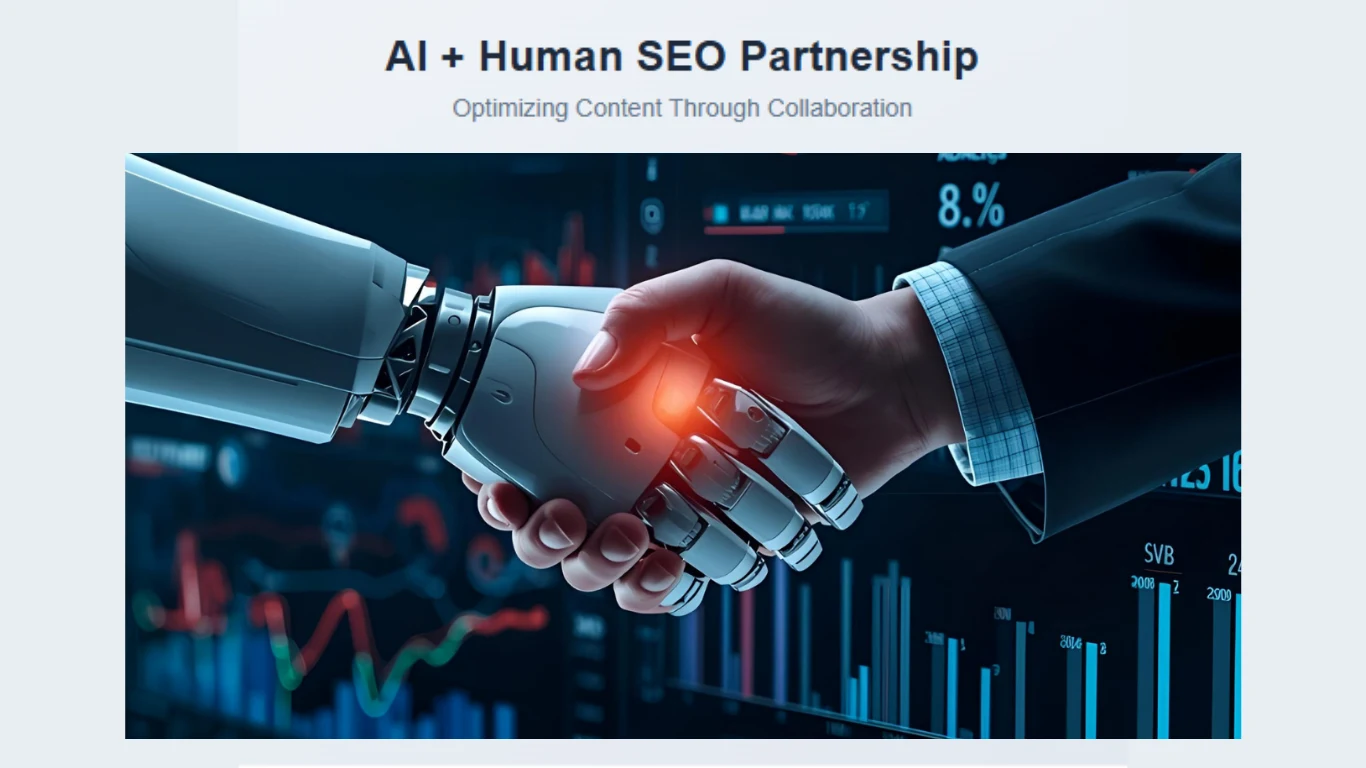
The Core Problem: When AI-Generated Content Hurts Your SEO
Let’s address the elephant in the room directly. Yes, AI-generated content can absolutely hurt your SEO. But it’s crucial to understand the “why.” Google doesn’t penalize content simply because an AI was involved in its creation. Google penalizes content that is low-quality, unhelpful, unoriginal, and created solely to manipulate search rankings.
Unfortunately, this is the exact kind of content that lazy or uninformed use of AI often produces at scale. Let’s break down the primary reasons why AI-generated content can become a liability for your SEO. Many website owners are discovering that Is AI-Generated Content Hurting Your SEO is a valid concern when they don’t implement proper strategies.
The central issue, when we ask Is AI-Generated Content Hurting Your SEO, is the lack of a human filter. Without expert oversight, AI can produce content that fails to meet the basic standards of quality and usefulness that search engines and users demand. This is why the question Is AI-Generated Content Hurting Your SEO is so prevalent; the potential for misuse is high.
We will now explore the specific ways this misuse manifests, ensuring you can avoid the pitfalls that lead to a negative answer when asking Is AI-Generated Content Hurting Your SEO.
1. Lack of Originality and Depth
AI models are trained on vast datasets of existing text from the internet. They are masters of pattern recognition and excel at regurgitating and rephrasing information they’ve already seen. However, they struggle to generate truly novel ideas, unique insights, or deep, nuanced analysis.
This often results in generic, surface-level content that adds no new value to the conversation. If ten other websites have published the same AI-generated article on “the benefits of remote work,” why should Google rank yours? It lacks a unique selling proposition (USP) and fails to differentiate itself from the sea of sameness.
Google’s algorithms are designed to find the most comprehensive and unique resource, and a simple rehash of common knowledge will never make the cut. When considering Is AI-Generated Content Hurting Your SEO, originality is a key factor that AI alone cannot guarantee.
2. Factual Inaccuracies and “Hallucinations”
AI models are not truth-tellers; they are sophisticated prediction engines. They can confidently state incorrect information, fabricate statistics, or misattribute quotes with complete certainty. This phenomenon is often called an “AI hallucination.”
Publishing AI content without rigorous fact-checking is a fast track to eroding user trust and damaging your site’s reputation for accuracy, a key component of EEAT. Imagine an AI-generated health article that misstates a medical dosage or a financial post that gives incorrect tax advice. The consequences can be severe, both for users and for your site’s standing with Google.
AI hallucinations are a real and documented problem, making human oversight non-negotiable. This is another reason why Is AI-Generated Content Hurting Your SEO becomes a concern for content creators.
3. Absence of EEAT (Experience, Expertise, Authoritativeness, Trustworthiness)
This is the most critical factor. Google’s algorithms are increasingly sophisticated at detecting content that demonstrates real-world experience and human expertise. An AI has no personal experience, no professional credentials, and no genuine opinions. It cannot share a case study from its own business, a personal anecdote that illustrates a point, or a unique perspective forged from years of practice.
Content that lacks this human element struggles to build trust and authority, both with users and with Google. Google’s EEAT guidelines are a direct response to the need for credible, expert information, something that raw AI content inherently lacks.
The question Is AI-Generated Content Hurting Your SEO is directly tied to these quality guidelines. Without human intervention, AI content fails to meet the EEAT standard, which can lead to a negative answer to the question Is AI-Generated Content Hurting Your SEO.
4. Spammy and Unnatural Language
While AI has become remarkably fluent, it can still produce text with a tell-tale “robotic” quality. This might include overly formal phrasing, repetitive sentence structures, or an awkward keyword density that screams “written for a bot, not a human.”
This poor user experience leads to high bounce rates and low dwell time, which are negative signals to Google. If a user lands on your page and immediately leaves because the content feels stale and unnatural, Google takes note. This is why many are asking Is AI-Generated Content Hurting Your SEO when they see engagement metrics dropping.
5. Scalability of Spam
The ease of generating massive amounts of content with AI is a double-edged sword. It enables spammers to create thousands of low-quality pages at scale, polluting the search results. In response, Google has become hyper-vigilant.
If your site exhibits patterns associated with large-scale, low-effort content publishing (e.g., thin content, duplicate topics, lack of authorship), you risk being flagged. The helpful content update was specifically designed to target this kind of content, regardless of how it was made.
So, when you ask, “Is AI-generated content hurting your SEO?” the answer is yes if you’re using it to publish unedited, unoriginal, and unhelpful content at scale. The danger lies in treating AI as a content creator, not a content tool. This misuse is the core reason why Is AI-Generated Content Hurting Your SEO becomes a reality for many sites.
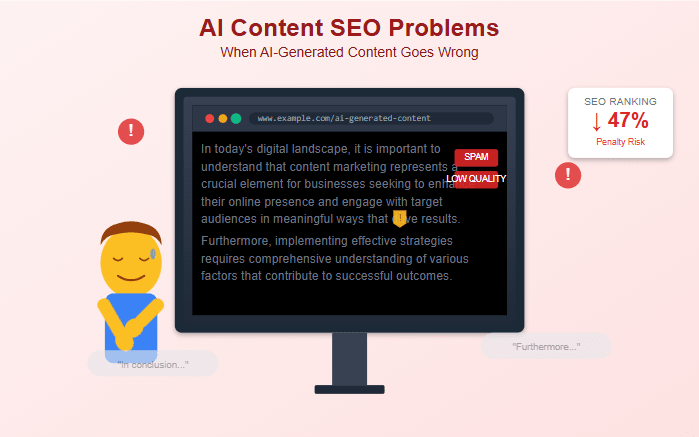
Google’s True Stance: It’s About Quality, Not Origin
To understand how to use AI correctly, we must first dispel the myth that Google has declared war on all AI content. The opposite is closer to the truth. In its official guidance, Google Search Central’s “About our approach to AI-generated content,” the company states its position clearly:
“Appropriate use of AI or automation is not against our guidelines. This means that it is not used to generate content primarily to manipulate search rankings, which is against our spam policies.”
Let’s break that down. The key phrase is “appropriate use.” Google’s focus has always been, and will always be, on rewarding high-quality, people-first content. The “helpful content system” is designed to do exactly that. It asks questions like:
- Does the content provide original information, reporting, research, or analysis?
- Does the content provide a substantial, complete, or comprehensive description of the topic?
- Does the content provide insightful analysis or interesting information that goes beyond the obvious?
- Would someone feel satisfied after reading this content?
- Does the content demonstrate first-hand expertise and a depth of knowledge?
Notice that none of these questions ask, “Was a human involved?” They are all about the value and quality of the final output. Google’s guidance explicitly says, “Automation has long been used to generate helpful content, such as sports scores, weather forecasts, and transcripts. AI has the ability to power new levels of expression and creativity, and to serve as a critical tool to help people create great content for the web.”
This is the crucial mindset shift. Google isn’t penalizing AI; it’s holding AI-assisted content to the same high standards it holds all content. The “spam policy” is triggered not by the use of AI, but by the intent behind its use.
If your goal is to manipulate rankings with low-effort content, you’re violating the guidelines, whether you wrote it yourself or used an AI. If your goal is to create helpful, reliable, people-first content, and you use AI as a tool to achieve that more efficiently, you are aligning with Google’s goals.
Therefore, the question “Is AI-generated content hurting your SEO?” is better rephrased as, “Is my content strategy, which may include AI, focused on creating value for my audience?” If the answer is yes, you’re on the right track. The right way to use AI as a tool is to enhance your ability to meet these quality standards, not to bypass them. Understanding Is AI-Generated Content Hurting Your SEO requires understanding Google’s focus on quality over origin.
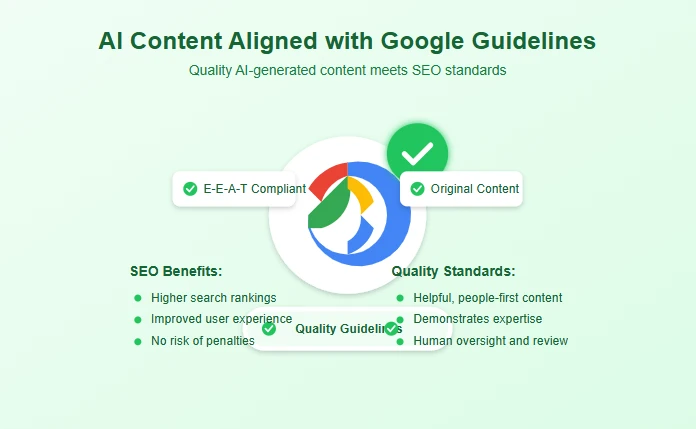
The Right Way to Use AI as a Tool: A Practical Methodology
Now that we understand the “why” and the “what not to do,” let’s dive into the practical, step-by-step methodology for using AI to boost your SEO. The core principle is to treat AI as your intelligent assistant, not the star author. The human remains the strategist, the editor, and the final arbiter of quality.
For a deeper dive into the tools and techniques themselves, our comprehensive guide on AI content creation is a great resource to complement this methodology. Many professionals find that when they ask Is AI-Generated Content Hurting Your SEO, the answer depends on their methodology.
This methodology is designed to ensure that the answer to Is AI-Generated Content Hurting Your SEO is a firm “no.” By following these steps, you can leverage the power of AI without falling into the traps that lead to penalties. The process ensures that human oversight and quality control are at the forefront of your content creation workflow.
Let’s explore how to make sure Is AI-Generated Content Hurting Your SEO is not a problem for you. This approach is the key to transforming AI from a potential liability into a powerful asset.
Step 1: AI for Ideation and Strategic Planning
One of the most powerful applications of AI is at the very beginning of the content creation process. Coming up with fresh, relevant topics that align with user intent can be a bottleneck. AI can supercharge this phase.
- Keyword and Topic Expansion: Feed your primary keyword (e.g., “sustainable gardening tips”) into an AI tool and ask it to generate a list of related long-tail keywords, questions people ask (People Also Ask data), and sub-topics. This helps you build a comprehensive topic cluster and identify content gaps your competitors have missed.
- Analyzing Search Intent: Use AI to summarize the top-ranking pages for your target keyword. Paste the text from the top 3-5 results and ask the AI to identify the common themes, the format they use (listicle, how-to guide, opinion piece), and the primary user intent (informational, transactional, navigational). This gives you a data-driven blueprint for creating content that is primed to compete.
- Brainstorming Angles: Struggling to find a unique angle? Ask the AI: “Provide 5 unique angles for an article about ‘sustainable gardening tips’ that haven’t been overused.” It might suggest focusing on “apartment balcony gardening,” “water-saving techniques for arid climates,” or “creating a compost system on a budget.” This helps you infuse originality from the start.
In this stage, AI is your strategic partner. It helps you work smarter and faster, ensuring your content is built on a solid foundation of data and strategic insight. When considering Is AI-Generated Content Hurting Your SEO, proper ideation is your first line of defense. This initial phase is crucial for setting a positive trajectory and ensuring that Is AI-Generated Content Hurting Your SEO is a question you answer proactively.
Step 2: AI for Creating Logical Outlines
A well-structured article is easier for users to read and for Google to crawl. A logical flow is essential for a good user experience. Once you have your topic and angle, use AI to generate a detailed outline.
For example, you could prompt an AI with: “Create a detailed, hierarchical outline for a 2000-word blog post on the topic ‘Water-Saving Techniques for Arid Climate Gardening.’ The target audience is beginner gardeners in Arizona. Include an introduction, 4-5 main sections with sub-points, and a conclusion.”
The AI will produce a structured framework that you can then refine. You can reorder sections, add your own unique sub-points, and ensure the narrative flows logically. This saves you significant time and helps you avoid the “blank page” syndrome, allowing you to focus on the quality of the content within each section rather than the overall structure.
Using AI for outlining is a perfect example of the right way to use AI as a tool and addresses the concern of Is AI-Generated Content Hurting Your SEO. This step helps create a solid skeleton that prevents meandering, low-value content.
Step 3: AI for Drafting the “Rough Cut”
This is where most people go wrong. They ask the AI to “write a 1000-word blog post” and then hit publish. The correct approach is to use the AI to write a first draft—a “rough cut” that you will then heavily edit and enhance.
Using your refined outline, ask the AI to write a draft for a specific section. For instance: “Write a 300-word draft for the section ‘Choosing Drought-Tolerant Plants’ based on the following outline points: [paste your points]. Use a conversational and encouraging tone for beginners.”
What you get back will be a block of text that covers the basics. It will likely be generic, lack specific examples, and have that slightly robotic feel. This is not your final content. This is your raw material. Think of it as an apprentice who has done the initial research and compiled a basic report.
Now, it’s your turn as the expert to step in. Understanding Is AI-Generated Content Hurting Your SEO means recognizing that AI drafts are just starting points. The mistake is to treat this draft as a final product, which is when Is AI-Generated Content Hurting Your SEO becomes a reality.
Step 4: The Human Element – The Critical Difference
This is the most important step in the entire process and the primary reason why AI-generated content won’t hurt your SEO when done correctly. This is where you inject the value that Google’s EEAT guidelines are looking for. This is the human touch that AI cannot replicate.
- Inject Personal Experience and Stories: This is your secret weapon. Did you personally try a specific technique that failed? Share that story. Did you have a breakthrough moment in your garden? Describe it. Personal anecdotes build trust and make your content relatable and memorable. Replace the AI’s generic statement “Many gardeners find success with mulch” with your own: “After losing my tomato plants to the scorching sun two years in a row, I finally discovered the magic of a 4-inch layer of cedar mulch. It was a game-changer, reducing my watering by half.”
- Add Unique Insights and Analysis: Go beyond the “what” and explain the “why” and “how.” The AI might tell you that “lavender is drought-tolerant.” You can add value by explaining why it’s a good choice for a specific microclimate in your region, which varieties perform best, and what common pests to watch for. This is your expertise shining through.
- Fact-Check and Verify Everything: Treat the AI’s draft as a collection of unverified claims. Double-check every statistic, quote, and technical claim. Cite your sources. Linking to authoritative studies or university extension websites not only ensures accuracy but also boosts your own site’s trustworthiness.
- Refine Tone, Style, and Voice: Rewrite sections to match your brand’s unique voice. Are you witty and informal, or authoritative and professional? The AI can be prompted to adopt a tone, but it will always be an approximation. You need to go in and make it sound authentically like you or your brand.
- Add Strategic Internal and External Links: A good piece of content doesn’t exist in a vacuum. Scan through your edited draft and identify opportunities to link to other relevant articles on your site (internal linking) to guide users and spread link equity. Also, link out to other non-competing, high-authority websites (external linking) to provide further value and show Google you’re part of a knowledgeable web community.
After this step, the content should be barely recognizable from the AI’s initial draft. The AI provided the scaffolding, but you built the house, furnished it, and gave it character. This is the difference between content that gets penalized and content that ranks. The answer to Is AI-Generated Content Hurting Your SEO becomes clear when you prioritize the human element. This step is the ultimate safeguard against the pitfalls that make Is AI-Generated Content Hurting Your SEO a true statement.
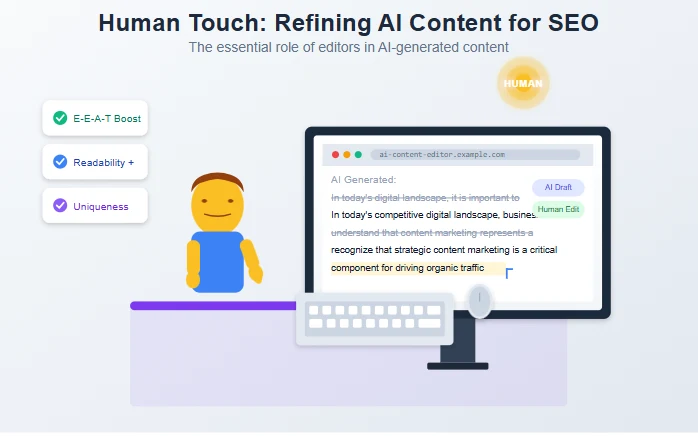
Step 5: AI-Assisted Editing and SEO Optimization
Once your content is polished and infused with human value, you can circle back to AI for a final round of technical and SEO-focused assistance.
- Grammar and Readability: Use AI-powered tools like Grammarly or Hemingway App to catch typos, grammatical errors, and awkward phrasing. These tools can also help you simplify complex sentences to improve readability, which is a positive signal for both users and search engines.
- Meta Title and Description: Paste your final article into an AI tool and ask it to generate 5 compelling SEO meta titles and descriptions. You can then pick the best one or mix and match elements from each. Ensure your primary keyword is included naturally.
- Keyword Optimization: While you should have naturally included keywords throughout the writing process, you can use AI to check for density and variations. Ask it: “Identify the main semantic keywords and LSIs in this article about ‘arid climate gardening’ and suggest places where I could naturally include related terms like ‘xeriscaping,’ ‘water-wise plants,’ and ‘soil amendment’.” This helps you avoid keyword stuffing while ensuring your content is semantically rich.
After optimizing your content, a full technical review is essential. Use our advanced SEO audit checklist to ensure your entire site is performing at its peak. By following this five-step process, you leverage AI for what it’s good at—data processing, pattern recognition, and speed—while retaining human control over the most critical elements: strategy, creativity, expertise, and quality.
This is the definitive answer to how to use AI as a tool without hurting your SEO. When properly implemented, Is AI-Generated Content Hurting Your SEO becomes a non-issue. This final polish ensures your content is not only high-quality but also technically sound, addressing all facets of the question Is AI-Generated Content Hurting Your SEO.
Case Study: From Idea to Rank with AI
Let’s walk through a hypothetical example. Imagine we run a financial literacy blog and want to target the keyword “how to save for a house on a low income.”
Step 1 (Ideation): We ask an AI to analyze the top 10 results. It tells us the common themes are: creating a strict budget, the 50/30/20 rule, high-yield savings accounts, and first-time homebuyer programs. It also suggests a unique angle: “The ‘Side-Hustle Savings’ Method for Low-Income Earners.”
Step 2 (Outlining): We use this angle to create an AI-generated outline, which we then refine to include sections on identifying side hustles, separating that income, and automating savings.
Step 3 (Drafting): We ask the AI to write a 400-word draft for the “Identifying Side Hustles” section. It gives us a generic list of freelancing, gig work, etc.
Step 4 (Human Element): This is where we transform it. We add a personal story: “I paid off my first $5,000 of debt by tutoring local high school students in math—a skill I already had.” We add specific, unique ideas like “digital decluttering services for seniors” or “local handyman work via apps like TaskRabbit.”
We fact-check the average earnings for these gigs and link to a Bureau of Labor Statistics report. We rewrite the tone to be encouraging and empathetic. This is how you ensure the answer to Is AI-Generated Content Hurting Your SEO is a positive one for your business.
Step 5 (Optimization): We run it through Grammarly, use an AI to generate 5 meta titles, and ask it to suggest LSI keywords like “down payment assistance programs” and “first home buyer savings account.”
The final article is a comprehensive, unique, and highly helpful resource that no AI could have created on its own. It has our voice, our experience, and our expertise. This is how you win and ensure Is AI-Generated Content Hurting Your SEO is answered with a resounding “no.” This case study shows the practical application of the methodology and proves that the question Is AI-Generated Content Hurting Your SEO has a positive answer when done right.
The Future of AI and SEO: What to Expect
The relationship between AI and SEO is still in its infancy. Looking forward, we can expect several key trends. First, Google’s own Search Generative Experience (SGE) will change how users interact with search results. Content that provides direct, concise answers within a conversational format may be prioritized.
This makes the “human element” even more critical, as AI-generated summaries will likely draw from sources with demonstrable expertise. Second, AI will become more integrated into content strategy tools, helping with predictive analytics, content performance forecasting, and even automated A/B testing of titles and meta descriptions.
The key for marketers will be to stay adaptable and focus on future-proof SEO strategies that prioritize user value above all else. The question will shift from “Is AI-generated content hurting your SEO?” to “How can I use the next generation of AI tools to provide even more value to my audience?”
Understanding Is AI-Generated Content Hurting Your SEO will become an essential skill for digital marketers. The future landscape will make the distinction between helpful and unhelpful AI use even more stark. The evolution of search means the answer to Is AI-Generated Content Hurting Your SEO will continue to depend on the quality and utility of the final product.
As AI gets better, so will Google’s ability to discern its lazy application. The focus will remain on the user, which is why a human-led approach is the only sustainable path forward. The conversation around Is AI-Generated Content Hurting Your SEO will evolve, but the core principles of quality will remain.
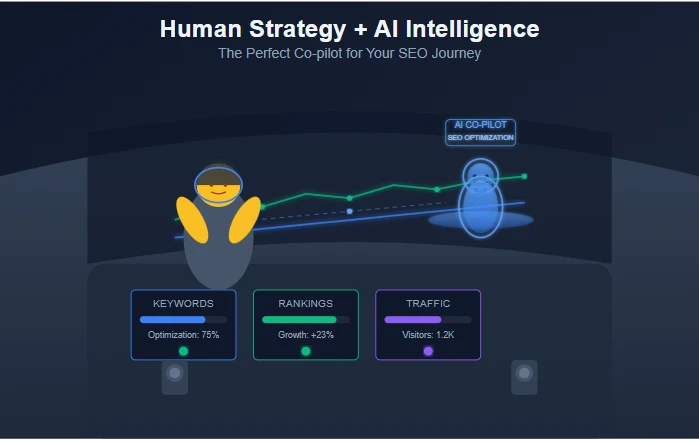
Conclusion: Your Co-Pilot in the Content Creation Cockpit
So, let’s return to the original question: Is AI-generated content hurting your SEO? The definitive answer is: it can, if you let it. But it doesn’t have to. The narrative that AI is an enemy of SEO is a false one. The real enemy is low-quality, unhelpful content, regardless of how it’s produced.
The future of successful SEO lies in a powerful synergy between human intelligence and artificial intelligence. The right way to use AI as a tool is to embrace it as your co-pilot. Let it handle the data-crunching, the repetitive tasks, and the first drafts. This frees you up to focus on what humans do best: strategize, innovate, share experiences, and create truly exceptional, people-first content.
By adopting this methodology, you can stop fearing AI and start harnessing its power to build a site that is rich in experience, expertise, authoritativeness, and trustworthiness that Google rewards. The question is no longer “if” you should use AI, but “how” you will master it to create a competitive advantage.
Use it wisely, and it will become one of the most valuable assets in your digital marketing arsenal. Understanding Is AI-Generated Content Hurting Your SEO is the first step toward leveraging AI effectively in your content strategy. The final verdict on Is AI-Generated Content Hurting Your SEO rests entirely in your hands. With the right approach, the answer is a confident no.
Ready to Master AI for Your SEO Strategy?
This guide is just the beginning. Our exclusive newsletter delivers cutting-edge AI marketing tips, in-depth tutorials, and actionable SEO strategies straight to your inbox every week.
Subscribe Now & Get Our Free AI Content Checklist!